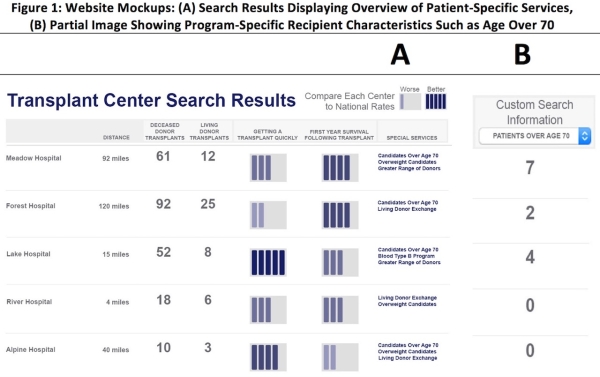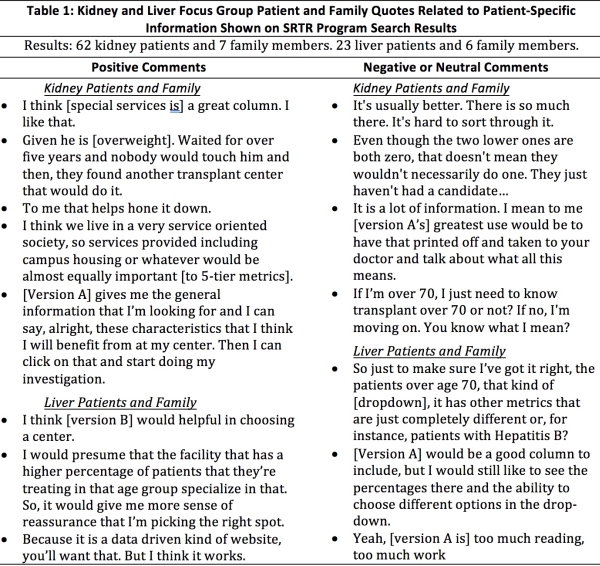Providing Transplant Candidates with Patient-Specific Public Reports about Programs That Transplant Patients Like Them
1Department of Medicine, Hennepin County Medical Center (HCMC), University of Minnesota (UMN), Minneapolis, MN
2Department of Epidemiology and Community Health, UMN, Minneapolis, MN
3College of Design, UMN, Minneapolis, MN
4Scientific Registry of Transplant Recipients, Minneapolis Medical Research Foundation, Minneapolis, MN
5Department of Surgery, UMN, Minneapolis, MN
6Division of Gastroenterology, Hepatology, and Nutrition, UMN, Minneapolis, MN
7Division of Gastroenterology and Hepatology, Stanford University, Palo Alto, CA
8Division of Hepatology, University of Washington, Seattle, WA.
Meeting: 2018 American Transplant Congress
Abstract number: B317
Keywords: Patient education
Session Information
Session Name: Poster Session B: Non-Organ Specific: Economics, Public Policy, Allocation, Ethics
Session Type: Poster Session
Date: Sunday, June 3, 2018
Session Time: 6:00pm-7:00pm
 Presentation Time: 6:00pm-7:00pm
Presentation Time: 6:00pm-7:00pm
Location: Hall 4EF
The Scientific Registry of Transplant Recipients (SRTR) provides federally mandated program-specific reports (PSR) to the public. Previous patient feedback indicated interest in tailoring search information based on patient-specific characteristics, such as age or cause of disease (Clin Transplant. 2017;e13125). Currently, there is little understanding of patient perceptions for potential tailoring methods. This study conducted kidney and liver focus groups for candidates and family members at one local center and national recipients from every United States region. Each 90-minute discussion included open-ended feedback on multiple website mockups depicting patient-specific data, such as raw data for individual characteristics (Figure 1A) or a combined overview of many characteristics (Figure 1B). Mockups used hypothetical programs with realistic data. The 21 total focus groups included 98 participants. Patients provided feedback supporting this PSR to learn more about programs that transplant patients with challenging characteristics (e.g. age over 70, high BMI, A2 blood type to B candidates).
The 21 total focus groups included 98 participants. Patients provided feedback supporting this PSR to learn more about programs that transplant patients with challenging characteristics (e.g. age over 70, high BMI, A2 blood type to B candidates).
CITATION INFORMATION: Schaffhausen C., Bruin M., Chu S., Matas A., Lake J., Kim W., Biggins S., Snyder J., Kasiske B., Israni A. Providing Transplant Candidates with Patient-Specific Public Reports about Programs That Transplant Patients Like Them Am J Transplant. 2017;17 (suppl 3).
To cite this abstract in AMA style:
Schaffhausen C, Bruin M, Chu S, Matas A, Lake J, Kim W, Biggins S, Snyder J, Kasiske B, Israni A. Providing Transplant Candidates with Patient-Specific Public Reports about Programs That Transplant Patients Like Them [abstract]. https://atcmeetingabstracts.com/abstract/providing-transplant-candidates-with-patient-specific-public-reports-about-programs-that-transplant-patients-like-them/. Accessed February 19, 2026.« Back to 2018 American Transplant Congress
